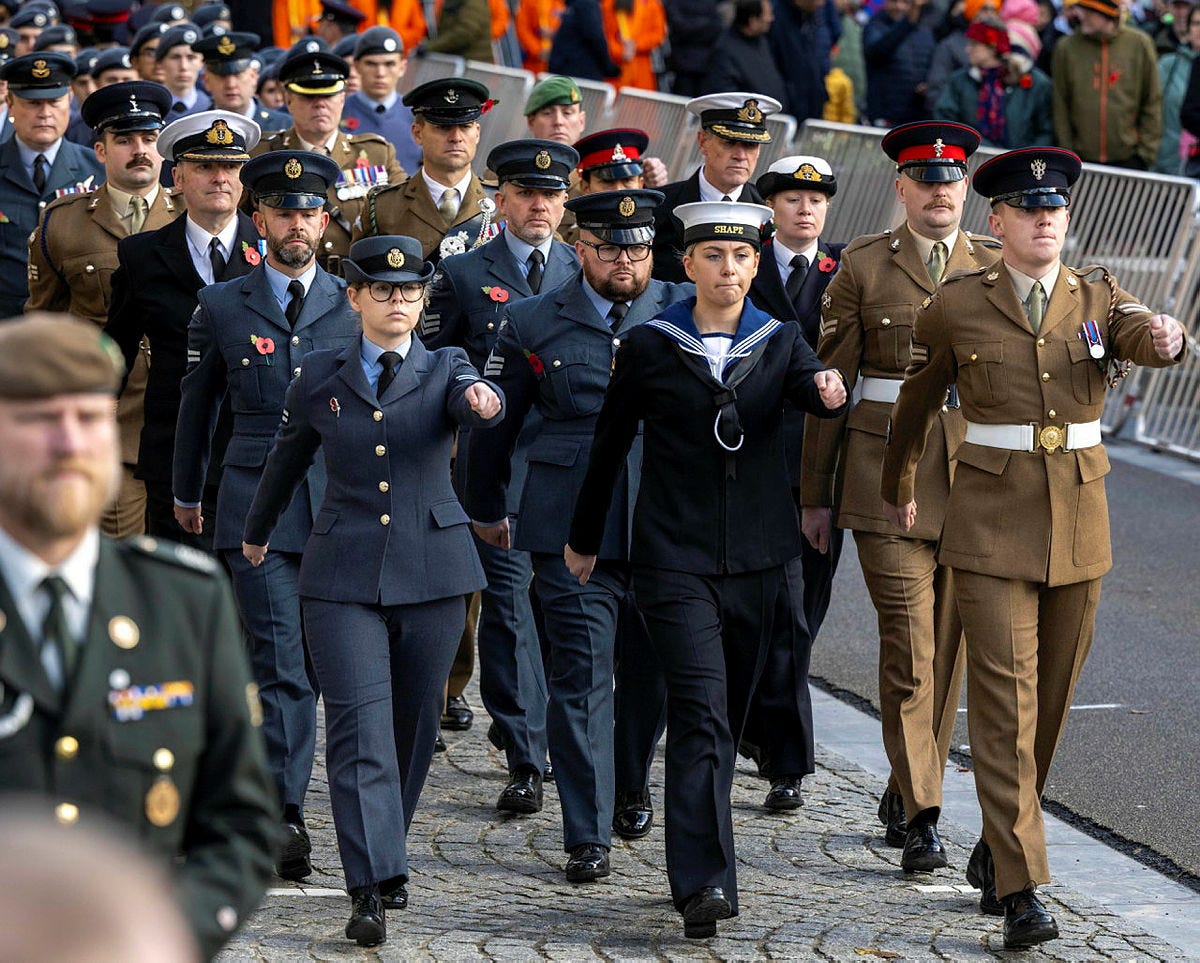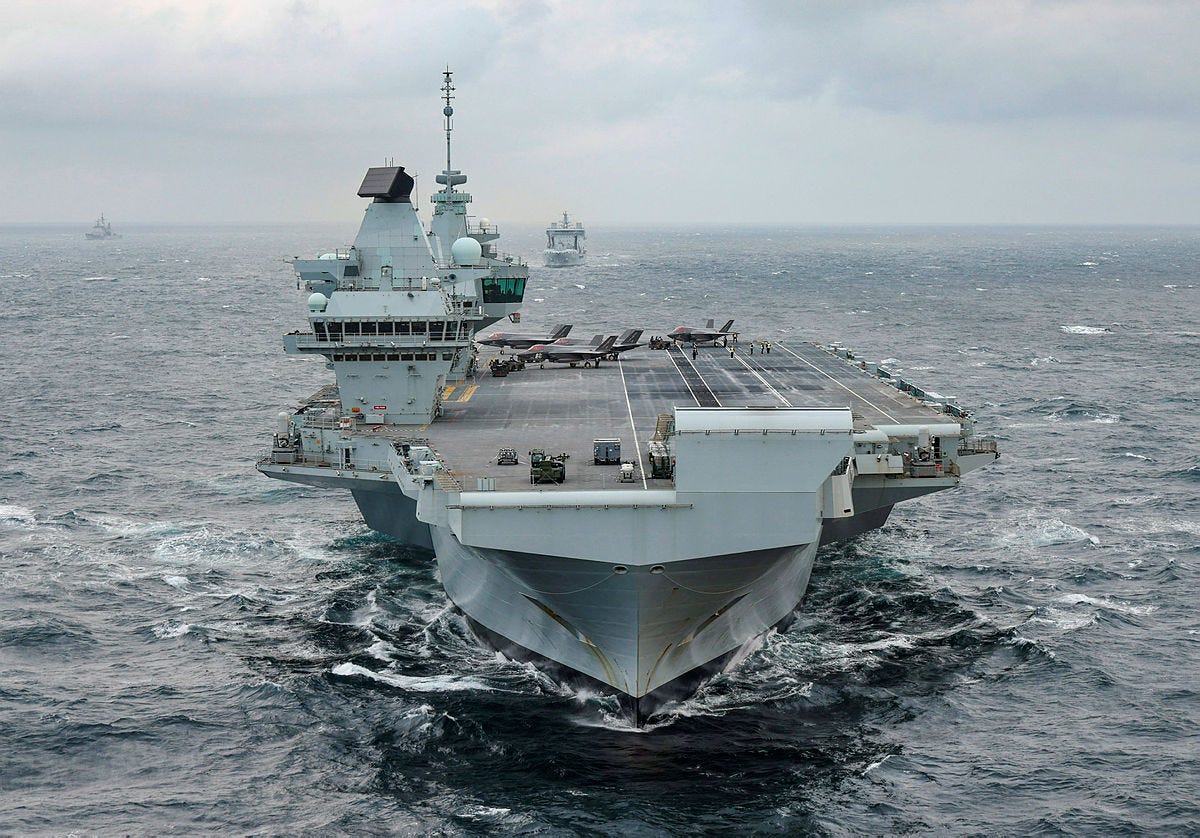We need more, they cry. From the hills it rings out – we need more. In the echoey halls of Parliament, it reverberates – we need more. From the Yorkshire dales to the Welsh valleys, it is heard – we need more. Even in the chambers of the Treasury, where calls for more are treated in Dickensian fashion, it is whispered – we need more. More people more tanks more planes more ammo more ships more rifles more submarines more trucks more drones. More. Plus de tout. Give us this day our daily munitions. Amen.
Every week we hear that the British military is hollowed-out and needs more funding. There isn’t enough of anything, and not enough money to go around. This can spiral into a doom-loop, and foster the narrative that the British military is helpless, terrible at everything, and completely outmatched. This is obviously not true, despite the manifold and serious challenges, and the UK has many strengths in the defence and security domains which are worth highlighting.
However, rather than just write a puff piece, I want to use this chance of a ‘mini-Net Assessment’ of our strengths to explore how we might prepare our defences for the future, and where we should prioritise our time and resource. I will discuss our strengths here in Part I, and will consider ways and means of prioritisation in Part II.
So, what are we actually good at? Where are our strengths? Where does the UK add value to the defence of the British people and our allies?
Personnel

War is People. The most critical component of any military force is its people; it is also the UK military’s greatest strength. We have some of the best-trained, most capable and talented men and women of any military in the world, many who have significant operational experience. In coalition and alliance environments we thrive, and our people are praised for their can-do attitude and willingness to get stuck in. However, we can’t rest on our laurels; as I’ve noted before, I don’t think we train enough at higher formation levels nor in all the specialities we need, and, in any case, there aren’t enough of our people to go around. The raw talent and potential is there, but still needs to be continually nurtured and cultivated.
Intelligence
The UK has an extensive intelligence community, from military and defence intelligence to the civilian agencies of GCHQ, MI5, and, of course, MI6 (cue James Bond theme here).1 Our membership of the Five Eyes (‘FVEY’) community ensures a very close intelligence relationship with sister agencies, especially in the United States; this may be somewhat more strained thanks to the current US administration, but I imagine so far little has changed for day-to-day operations.2 The UK benefits from the incredible collection capabilities available to the United States, while providing many niche capabilities and sources where even the US may not have access. It is telling that the Russians have historically seen the UK as being the ultimate ‘bogeymen’ or ‘puppetmasters’ amongst their adversaries, often attributing all sorts of malign activity to British intelligence.3 Probably an unwarranted reputation in most cases, but, frankly, if anyone was going to know, it would be the Russians…
Cyber
Related to the above, the UK is considered a serious player in the cyber game. The UK has two major cyber defence (and offense) organisations – GCHQ and the National Cyber Force – but is also considered a leader on cyber security more broadly.4 Cyber is now considered one of the ‘domains’ of warfare (alongside land, air, maritime, space, and, depending on who you talk to, the electromagnetic or informational) and the ability to contest this space is a key capability required of any major power, especially as Artifical Intelligence rapidly grows in sophistication.
Special Forces

Arguably little-discussed is the quality and reach of our special forces. The SAS, SBS, SRR and all their supporting elements provide a powerful, flexible force able to conduct highly-sensitive missions across the full spectrum of operations. The UK special forces community has recently been complemented by other ‘special operations forces’ able to conduct lower-level special taskings, including the Army Ranger Regiment and elements of the Royal Marines.5 While heavily associated with counter-terrorism and grey-zone warfare thanks to the legacy of the War on Terror, these forces also have a key role in full scale war by operating behind enemy lines and conducting raiding, strikes, and supporting partisans.6 Special Forces can’t replace conventional forces, no matter what operator-bros tell you, but they provide a complementary set of capabilities that shouldn’t be underestimated.
Nuclear Weapons
The UK is one of a handful of nuclear powers, with a powerful strategic deterrent that has operated continually at sea since 1969.7 It is the final backstop of our security, and something that our adversaries undoubtedly take note of. Recently there have been very real concerns about the reliance on the US for the sustainability and replacement of the deterrent; but it should be emphasised that the operation of the weapon is completely sovereign. I doubt Russian war planners have disregarded the UK nuclear deterrent simply due to the change in the White House.
Global Basing

A legacy of Empire, the UK still operates a network of overseas bases, reaching from the Falklands in the South Atlantic all the way to the Brunei Garrison in the Pacific. This reach is almost unmatched – France is about equal, and only the USA has more. Many of these bases are, unsurprisingly, plonked in key strategic locations. The sovereign bases in Cyprus, for instance, provides the UK with the ability to project air power over the Eastern Mediterranean and much of the Middle East.
Naval and Air Power

The UK is one of the top European maritime powers, alongside France and Italy, and contributes sizeably in the air as well. At sea, we operate two large aircraft carriers, nuclear attack submarines (my overview here), a capable minehunter fleet, and a number of sustainment vessels. In the air, the RAF can muster a solid number of advanced fighter jets, surveillance and intelligence aircraft, maritime patrol planes, and strategic airlift, including the chonky C-17 Globemaster. Furthermore, both the Navy and the RAF are busy (too busy, frankly) which ensures that their personnel are continually gaining experience, and have long traditions of operational excellence.
The Weaknesses
The above is a whistle-stop tour of some of our relative strengths, especially within NATO. Against that we have many weaknesses; I won’t dwell on them as they are well-publicised, but they include over-stretched and undermanned Armed Forces; a general lack of assets, poor availability of certain platforms and no depth to our force; some key capability gaps (cough *SEAD* cough) thanks to the peace dividend and War on Terror; and an inability to procure new equipment at speed or on budget.
Many of these issues are particularly stark in our land forces – the British Army is in a far worse shape than the other services – and are made worse by poor policy decisions and risk-adverse processes which make recruitment, procurement, and innovation painfully slow. For instance, we have some of the best pilots in the world - but it takes the better part of a decade to get a junior cadet into the seat of a fighter plane or attack helicopter as a qualified pilot.8 This way of doing business is, at heart, strategically unsound.
Conclusion
Broadly, the UK can be said to have some key strengths in strategic capabilities – i.e., high-level stuff like nuclear weapons, cyber, and intelligence – but lacks the same weight when it comes to a lot of tactical activity, especially on the land. We can fire nuclear weapons but not deploy an armoured division; we have two powerful aircraft carriers but lack enough sovereign F-35s (or pilots) to form two full carrier air wings.
This then leads to the great question - what to prioritise for the future? Do we double-down on our strengths, or try and plug the gaping holes and shore up our weak points?
Find out next time in Part II.
What do you think are the UK’s major strengths? Did I miss any or get any of the above wrong? Let me know in the comments below!
All the best,
Matthew
Unsurprising hot-take: the Le Carré novels are far superior spy fiction than any of Ian Fleming’s works. If you haven’t read (or watched) Tinker Tailor Soldier Spy or The Constant Gardener you are doing yourself a disservice.
The situation may well change - who knows with the Trump administration - but it should be remembered FVEY has weathered collossal intelligence breaches many times in the past, including a multitude from the United States. Remember Teixeira (2023) and Snowden (2013)?
An excellent summary of Anglo-Russo relations can be found in this episode of the inimitable In Moscow’s Shadows Podcast.
Most surveys put the UK firmly in the top rank for cybersecurity and cyberpower; ITU rates us as ‘Tier 1: role-modelling’, the Belfer Centre put us at 6th for cyber power in 2022, and, relatedly, the Tortoise AI Index puts the UK at 4th for AI potential. The UK has recently dropped in the NCSI ratings, though this appears to be a bit of an outlier.
For the Americans amongst ye: the British Army Ranger Regiment is a very different beast from the US Army Rangers, with a completely different role.
It should also be emphasised that the need for counter-terrorism and grey-zone capabilities has not gone away. Arguably the ability to contest the latter has become even more important since Russia’s invasion of Ukraine.
The ultimate book on the Royal Navy’s submarine service and the nuclear deterrent since 1945 is The Silent Deep. A must-read for people interested in the subject.
Comparisons are always imperfect, but a reminder that the average RAF pilot in the 1940s was barely twenty years of age.




Comparisons are always imperfect, but a reminder that the average RAF pilot in the 1940s was barely twenty years of age.
And the planes went half as fast and there were 1/4 as many knobs and dials in the cockpit.
Matt, your style is brisk and entertaining!
Nice article and I appreciate the overview. When anyone asks for more resources, one should always ask:
1. Where are these resources coming from? Most governments do not create wealth, so they have to take it from somewhere else and there are always trade offs involved.
2. What is the end state of this revitalization? What specific force structure is required to achieve what goals? This will drive costs and how many ships, aircraft, ground systems, support networks and personnel are required.
3. Can you feasibly sustain this effort politically and financially?
If you do not know where you are going, how will you know when you have arrived (and I would absolutely ask the US Secretary of Defense the same questions)?